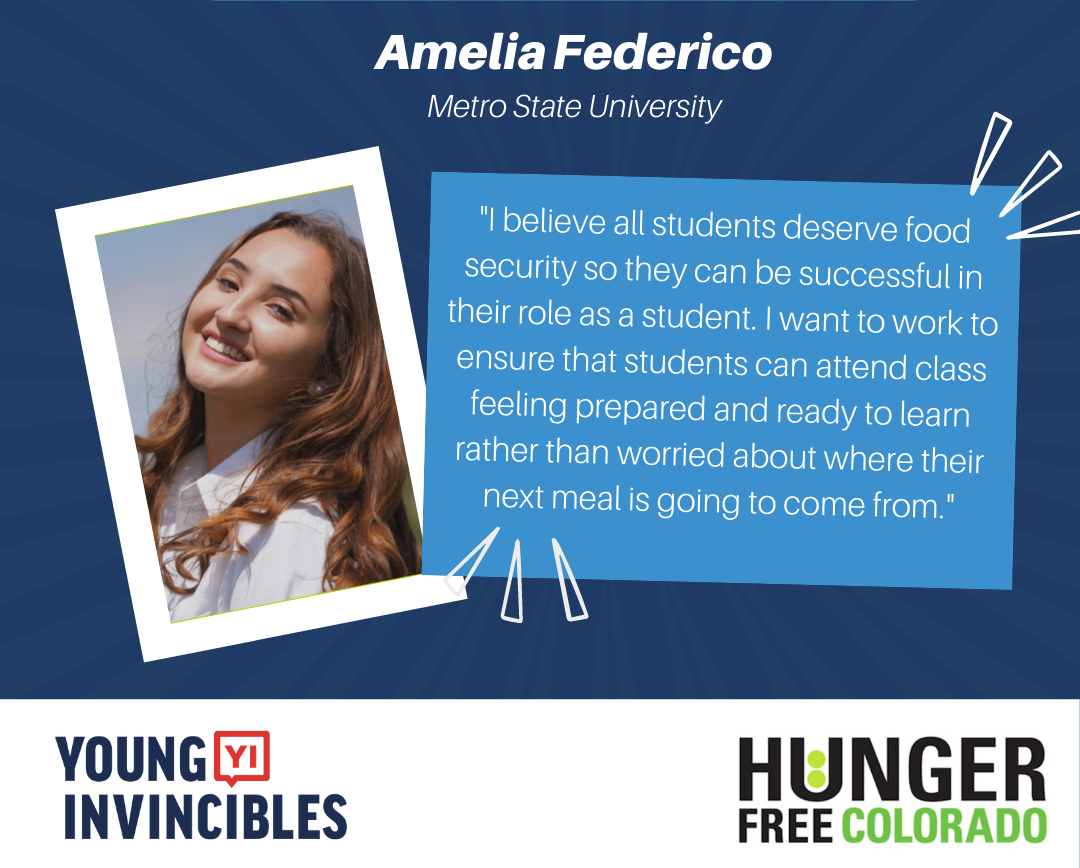By Amelia Federico
This summer I had the opportunity to work with Hunger Free Colorado and Young Invincibles as a Community College Fellow, assisting with policy development and designing outreach tools aimed at increasing SNAP access on college campuses across Colorado. SNAP, the Supplemental Nutrition Assistance Program, is an income-based program that provides funds to purchase groceries and address hunger, also known as food insecurity. As the fall semester gets underway and college students are back in class, it is important to educate ourselves about the importance of addressing food insecurity on college campuses.
As a former community college student, I have seen and experienced first hand the struggles and barriers students can face. Food insecurity being one of them. When students lack the funds for adequate or nutritious food, it can act as a barrier to success, preventing students from performing their best. Food insecurity impacts too many of our population and can affect communities all over the world. Specifically, on community college campuses, a lot is at stake for college students. Allow me to paint this reality. School is expensive; you have an application fee, school supplies, textbooks, and tuition, not to mention living expenses. Some students might be supporting themselves with no additional financial support, which can leave them in a vulnerable financial position and at risk of food insecurity. Food is a bare necessity, but today, so is a college education.
I now attend Metropolitan State University (MSU) in Denver. I applaud MSU for being among the first four Hunger Free Campuses in the state. This designation was launched this year by the Colorado Department of Higher Education as a statewide initiative to address food insecurity on Colorado’s college campuses. The Hunger Free Campus Checklist provides institutions with a menu of programs for addressing hunger on campus, including running campus food pantries, hosting awareness events, collecting and reporting on student food insecurity data, and conducting SNAP education and outreach, among others. I have seen the difference it makes to attend school at an institution that has student hunger on their radar. In addition to knowing I have access to food resources on campus, attending a Hunger Free Campus lets me know as a student that I am supported by my University on a personal level. This allows me to prioritize my responsibilities as a student without additional stressors.
As students, parents, teachers and community members, we must work to ensure the well-being of students who are on the path to paving their future. By doing so, we as a collective are investing in the future of our community and our world at large. I have seen the positive impacts on my life of attending a Hunger Free Campus and I call on other Colorado colleges and universities to implement the Hunger Free Campus Checklist in their academic community. Students deserve to have their basic needs met so they can prioritize their school work and achieve their highest potential.
Amelia started her higher education at the Community College of Denver and is now a sophomore studying political science at Metropolitan State University.
Learn more about the Hunger Free Campus Checklist: https://cdhe.colorado.gov/social-determinants-of-student-success

